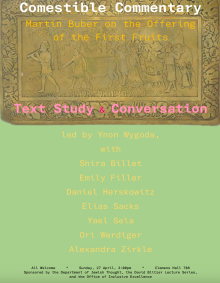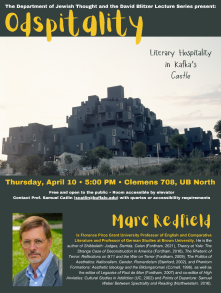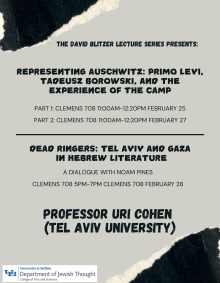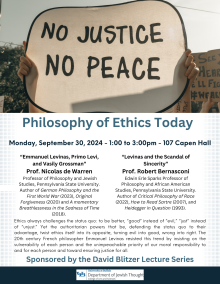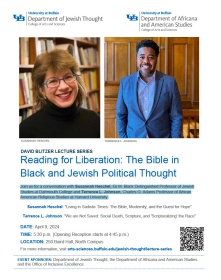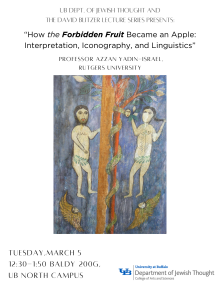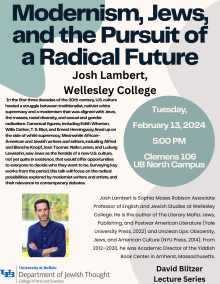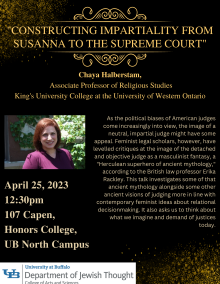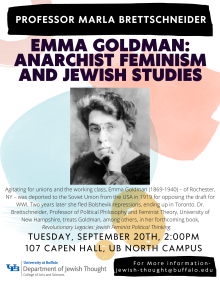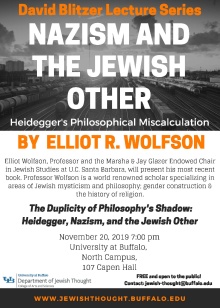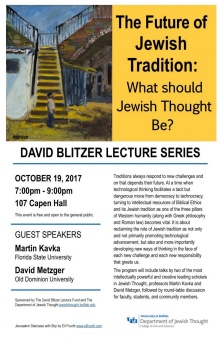David Blitzer Lectures
This annual series honors the life of David Blitzer (1922–2002), a Holocaust survivor who rebuilt his life in Buffalo with resilience and generosity. Born in Oswiecim, Poland (Auschwitz), David endured forced labor camps, the loss of most of his family, and the upheaval of emigration. After arriving in Buffalo in 1949, he became a successful builder, community leader, and supporter of Jewish life. His legacy lives on through this lecture series, which brings distinguished voices in Jewish studies to UB.
"Ethics of Commentary"
Date: April 27th, 2025
Time: 3:00pm
Location: Clemens 708
Comestible Commentary Martin Buber on the Offering of the First Fruits
Text Study and Conversation led by Ynon Wygoda, with Shira Billet, Daniel Herskowitz, Eli Sacks, Yael Sela, Ori Werdiger, and Alexandra Zirkle
Please register for this event by emailing Professor Alexandra Zirkle at azirkle@buffalo.edu by Friday, April 25th 5:00pm.
"Odspitality: Literary Hospitality in Kafka’s Castle”
Date: April 10, 2025
Time: 5:00pm
Location: Clemens 708
Marc Redfield, Florence Pirce Grant Professor of English and Comparative Literature and Professor of German, Brown University
Uri Cohen of Tel Aviv University Visits UB!
Representing Auschwitz: Primo Levi, Tadeusz Borowski, and The Experience of the Camp
Part 1: Clemens 708 11:00am-12:20pm February 25
Part 2: Clemens 708 11:00am-12:20pm February 27
Dead Ringers: Tel Aviv and Gaza in Hebrew Literature
A Dialogue with Noam Pines
Clemens 708 5pm-7pm Clemens 708 February 26
David Blitzer Lecture Series
About David Blitzer
Courtesy of Ms. Helena Schwartz
David Blitzer was born in 1922 in the Polish town of Oswiecim, better known by its German name Auschwitz. He however called it by its Yiddish name, Oshpitzin. He was the third child of a family of three brothers and three sisters. The family was pious; they were Bobover chasids and David was yeshiva-educated.
When the Nazis invaded Poland in 1939, the Jews were moved to a town 30 kilometers way, called Sosnowiec.. Ultimately David & his brother Joshua worked in a series of slave labor camps but interestingly never in Auschwitz. His brother died on a forced march just weeks before liberation. David later learned that his two sisters were shot in the marketplace and his parents and baby brother were gassed at Auschwitz. Only his sister Rachel, Irv Stein’s mother, survived.
After the war, while searching for his sister, he met a young woman on a train named Cesia Zylberfuden. They decided 3 days later to get married. Immediately after being married, they found a guide who smuggled them over the border from Poland to the American sector of Germany. Their goal was to emigrate to America. In Germany they lived in Augsburg, which is about a half hour from Munich. David quickly became a successful businessman with his own dry goods firm employing some 24 people. Their two children, Helena and Wolf, were both born there.
One day David saw a long line and got on it because in those days if you saw people in a line, you figured they were getting something you would want too. It turned out to be a line for visas to America. David got visas for the whole family including his and Cesia’s siblings. The U.S. didn’t want all the refugees to settle in one place so they arranged for them to settle in various cities. David’s visa was for Buffalo, New York, which pleased him because he had heard of New York. Little did he know that Buffalo was more than 400 miles from New York City!
The Blitzers came to America in 1949. They knew not a word of English nor did they have any family or friends. With the help of HIAS (the Hebrew Immigration Aid Society), David got an apartment on William Street and a job at Bethlehem Steel but it was a far cry from the comfortable life he had in Germany with a maid and a nanny for the children. He and his brother-in-law Sam Friedman decided to open a kosher restaurant and delicatessen on Hertel Avenue. Blitzer’s became a fixture in Buffalo. Sam Friedman stayed in the deli business but Dave had a friend in New Jersey who had become a successful home builder. He decided to give that a try, first building a home for his own family on Parkwood in Kenmore. He knew nothing about construction but the tradesmen taught him what he needed to know. He would write down their instructions in Hebrew characters (as Yiddish is written). Ultimately the firm he built became Forbes Homes, at one time the largest home builder in western New York.
Both David and Cesia became active leaders in the Jewish Community. David was president of Ahavas Achim Lubavitch synagogue on Tacoma and Cesia became president of the city-wide Hadassah organization. David was a proud and generous Jew and Zionist, a patriotic and grateful American, but he was also a quiet and gentle man who never had a mean thing to say about anybody. If someone was nasty, he said that person had “no common sense” so why should he get upset? He was always upbeat despite his terrible losses. He adored his wife and family but he had serious misgivings about his son becoming a journalist (he wanted him to go to law school). In the end, however, he became Wolf’s his second-biggest fan (the first was Wolf’s mother).
He died in 2002, a happy man beloved by his wife, children, five grandchildren and all who knew him.
Previous Lectures
Two Lectures on Ethics Today
September 30, 2024, Monday, 1:00-3:300pm
Honors College, Capen 107
Nicolas de Warren, Professor of Philosophy and Jewish Studies, Pennsylvania State University: "Emmanuel Levinas, Primo Levi and Vasily Grossman."
Robert Bernasconi, Edwin Erie Sparks Professor of Philosophy and African American studies, Pennsylvania State University: "Levinas and the Scandal of Sincerity."
"Reading for Liberation: The Bible in Black and Jewish Political Thought"
Date: April 9, 2024
Time: 5:30pm
Location: Baird 250, UB North Campus
A Conversation with Susannah Heschel and Terrence L. Johnson. Presented by: Department of Jewish Thought, David Blitzer Lecture Series, Office of Inclusive Excellence, and the Department of Africana and American Studies
"Forgetting" by Professor Azzan Yadin-Israel
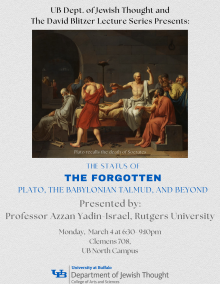
Date: March 4, 2024
Time: 6:30pm
Location: Clemens 708
Presented by: Department of Jewish Thought and the David Blitzer Lecture Series
"Forbidden/Forgotten Fruit: The Mystery Solved" by Professor Azzan Yadin-Israel
Date: March 5 2024
Time: 12:30pm
Location: Baldy 200G
Presented by: Department of Jewish Thought and the David Blitzer Lecture Series
"Modernism, Jews, and the Pursuit of a Radical Future" by Professor Joshua Lambert
Date: February 13, 2024
Time: 5:30pm
Location:Clemens 106
In the first three decades of the 20th century, U.S. culture hosted a struggle between traditionalist, nativist white supremacy and a modernism that was aligned with Jews, the masses, racial diversity, and sexual and gender radicalism. Canonical figures, including Edith Wharton, Willa Cather, T. S. Eliot, and Ernest Hemingway, lined up on the side of white supremacy. Meanwhile African-American and Jewish writers and editors, including Alfred and Blanche Knopf, Jean Toomer, Nella Larsen, and Ludwig Lewisohn, saw Jews as the heralds of a new U.S. culture, not yet quite in existence, that would offer opportunities to everyone to decide who they want to be. Surveying key works from the period, this talk will focus on the radical possibilities explored by modernist writers and artists, and their relevance to contemporary debates.
Josh Lambert is Sophia Moses Robison Associate Professor of English and Jewish Studies at Wellesley College. He is the author of The Literary Mafia: Jews, Publishing, and Postwar American Literature (Yale University Press, 2022) and Unclean Lips: Obscenity, Jews, and American Culture. From 2012–2020, he was Academic Director of the Yiddish Book Center in Amherst, Massachusetts.
Presented by: Department of Jewish Thought and the David Blitzer Lecture Series
"Constructing Impartiality from Susanna to the Supreme Court"
Date: April 25, 2023
Time: 12:30pm
Location: 107 Capen, UB North Campus
As the political biases of American judges come increasingly into view, the image of a neutral, impartial judge might have some appeal. Feminist legal scholars, however, have levelled critiques at the image of the detached and objective judge as a masculinist fantasy, a "Herculean superhero of ancient mythology," according to the British law professor Erika Rackley. This talk investigates some of that ancient mythology alongside some other ancient visions of judging more in line with contemporary feminist ideas about relational decisionmaking. It also asks us to think about what we imagine and demand of justices today.
Chaya Halberstam, Associate Professor of Religious Studies, King's University College at the University of Western Ontario
"Emma Goldman: Anarchist Feminism and Jewish Studies" by Professor Marla Brettschneider
Date: September 20th, 2022
Time:2:00pm
Location: 107 Capen, UB North Campus
Agitating for unions and the working class, Emma Goldman (1869-1940) - of Rochester, NY - was deported to the Soviet Union from the USA in 1919 for opposing the draft for WWI. Two years later she fled Bolshevik repressions, ending up in Toronto.
Dr. Brettschneider, Professor of Political Philosophy and Feminist Theory, University of New Hampshire, treats Goldman, among others, in her forthcoming book,
"Nazism and the Jewish Other" By Professor Elliot R. Wolfson
Book discussion of his most recent book: "The Duplicity of Philosophy's Shadow: Heidegger, Nazism, and the Jewish Other"
Date: November 20, 2019
Time: 7:00pm
Location: 107 Capen Hall
Elliot Wolfson is a professor and the Marsha and Jay Glazer Endowed Chair in Jewish Studies at U.C. Santa Barbara. Elliot Wolfson received bachelor and master of Arts degrees from Queens College of the City University of New York, where he pursued the study of philosophy, focusing especially on phenomenology, hermeneutics, and existentialism. He received master of arts and doctor of philosophy degrees from Brandeis University, where he specialized in the study of the Kabbalistic texts and traditions that have remained central to his scholarly work. He was the Abraham Lieberman Professor of Hebrew and Judaic Studies at New York University, where he taught between 1987 and early 2014. These events are co-sponsored with the Department of Comparative Literature.
Past David Blitzer Lectures:
The Future of Jewish Tradition: What Should Jewish Thought Be?
Oct. 19, 2017 at 7pm
107 Capen Hall, University at Buffalo, North Campus
Speakers:
Martin Kavka, Florida State University
David Metzger, Old Dominion University
